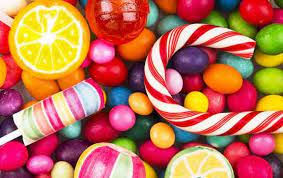The worst foods for your teeth and oral health
- Hollie Young
- Feb 1, 2023
- 3 min read
Our oral health can have such wide reaching effects on our physical and mental health as well as our speech, so it is crucial we do our best to avoid any issues. Brushing at least twice a day and flossing once a day is great, but is there anything extra we can be doing with our diet to help?
The plaque that forms on your teeth naturally contains bacteria. When sugary foods are added into your diet, that bacteria feeds on the sugar and metabolises, turning it into acid which will dissolve your tooth enamel, leading to cavities. We all know that sugary foods are bad for our teeth, but have you ever given any consideration to those foods we may not realise can damage our teeth and impact on our oral health?
Foods to avoid and to be made aware of hidden sugars as some healthy foods can contain sugar!
1) Sweets and Desserts
Those sticky sweets like caramels, lollipops or bonbons can be harder for your saliva to wash away, meaning the sugar will linger for longer on your teeth, increasing the risk of tooth decay. If you do have a sweet tooth, and just cannot resist, try to brush your teeth after finishing eating which can reduce the risk to you.

2) Soft Drinks
Even if soft drinks are sugar-free or diet, they contain acid which can erode the enamel surface of the teeth, in turn causing cavities. If you do have a soft drink, avoid brushing your teeth immediately afterwards. This is because the acid can weaken the teeth, making them vulnerable to abrasion from your toothbrush.
3) Pickles
Anything that has been pickled in vinegar, by its very nature is acidic. As with soft drinks above, this acid can cause dental erosion and lead to tooth decay.
4) Wine
White and red wine contains erosive acid, which softens enamel. Red wine contains compounds called tannins, which can dry your mouth out and stain your teeth. If you plan on drinking wine, be sure to brush your teeth beforehand. This can help to reduce the amount of plaque that wine can stick to. It’s also helpful to wait 30 minutes after drinking wine to brush your teeth to avoid brushing the acid from the wine into your teeth.
5) Citrus Fruit
As with the acidic foods listed above, citrus fruits contain high levels of acid that can erode teeth. If drinking fruit juice, it is best to use a straw to avoid as much contact with teeth as possible.

6) Crackers
Crackers are refined carbohydrates, and numerous studies have founds links between high refined carbohydrate consumption to body inflammation. Inflammation is the main player in various chronic diseases such as periodontitis and gingivitis (inflammation around the tissues supporting your teeth).
7) Sports Drinks
Similarly to soft drinks, those high sugar and acid content, viscous sports energy drinks can be detrimental to your oral health for all the reasons we have mentioned above.
8) Sugar
This is kind of obvious, but no matter whether the sugar is refined white sugar, brown sugar, or honey, it is still sugar, and will still cause damage to your teeth. When sugar is added into your diet, it turns your mouth into an acidic environment. If you are eating sugar consistently, this acid will continuously erode your tooth enamel. Be aware of ‘hidden sugars’ for example in ketchup or ‘no added sugar’ juices, as they can still contain high amounts of it.
9) Dried Fruit
Dried fruit such as raisins, apricots, or mango contains high concentrated levels of sugar, and the texture of them can lead the sugars to cling to teeth for longer, leading to potential tooth decay.
10) Foods with Hidden Sugars!
As mentioned above, many foods contain ‘hidden sugars’
Whilst some of these options- eg tomato pasta sauce are healthy options they can contain contain hidden sugars we aren't aware of, so read your labels and ensure to limit hidden sugars in your diet where possible.
it is important to read your food labels. Some foods don’t have the word ‘sugar’ in the ingredients list on their packaging, but still have sugar in them – it’s just labelled in a different way. Hidden sugars usually end in ‘ose’ and the nearer the start of the list they are, the bigger the amount included: sucrose, dextrose, maltose, fructose, lactose, glucose, honey.
Foods to look out for that contain hidden sugars:
cereal bars, flavoured yoghurts, fruit flakes/bars, juice – including juice labelled ‘no added sugar’, ketchup, bbq sauce, bread.

In summary, avoiding high sugar or acid content foods, and being aware of ‘hidden sugars’ in food and drink, will stand you in good stead. Good oral hygiene can combat most of the damage caused, so make sure you are brushing at least twice, and flossing once a day. As always, if you have any dental concerns, get in touch with our team at CTL Dental on 01748 850607 or email us at ctldental@gmail.com.





Comments